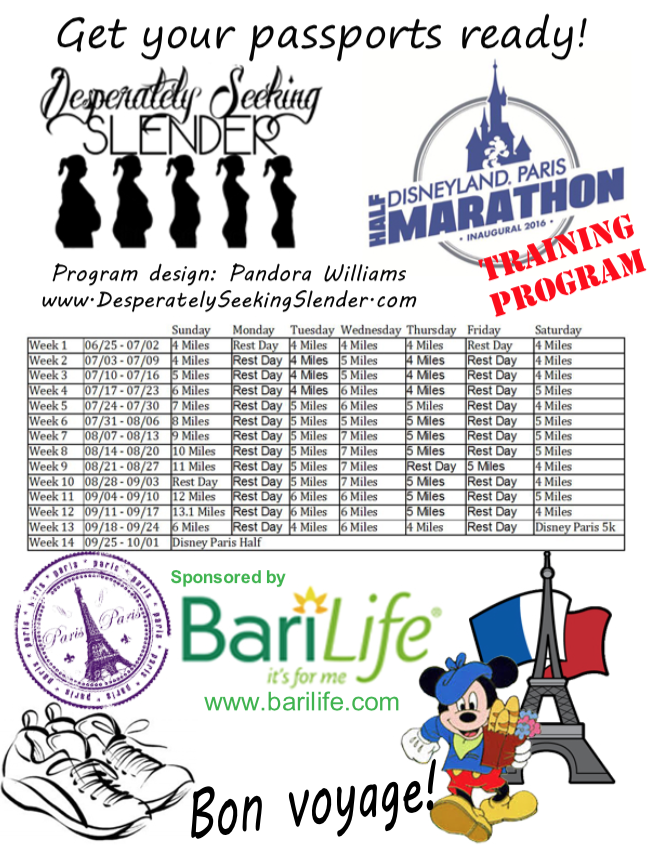Blog #3 Half Marathon Training Tipswritten by our guest blogger, Pandora Williams. A Personal Trainer, Wellness Coach, Motivational Speaker and marathon runner all after having bariatric surgery and losing 260 pounds! Pandora is dedicated to helping pre and post operative bariatric patients find a healthy balance in life to reach and maintain weight loss goals while battling obesity. If you missed her introductory blog Read Blog #1 HERE! In her second blog she shares the #1 Concept Bariatric Patients should grasp after bariatric surgery – Read Blog #2 HERE!
If I can do it, You can do it!
Completing a half marathon is no little feat. Whether you are running it or walking it, taking on a half marathon is a pretty serious goal. Your average person doesn’t just wake up one morning and say “Oh, I think I will run a half marathon today.” Completing a half marathon takes dedication, determination and most of all, in my opinion, training. This is especially true if you still want to be walking upright afterwards. Here are some Half Marathon Training Tips.
Running my first half marathon didn’t come without training. I had trained up to walking a half marathon first. Then I started running 5ks and 10ks using the Jeff Galloway run/walk method. I am not sure I was physically ready to run a half marathon that morning, but emotionally it was something I needed.
Sometimes emotions and adrenaline can get you farther than you can ever imagine.
I knew that I could complete a 10k distance of 6.2 miles, but that wasn’t enough to burn off the emotional fuel that I had inside of me. So, I decided that I would try for a 15K and run 9.3 miles and when that 9.3 came I decided hey maybe I could do a 20k and do 12.4 miles.
I will never forget hitting a physical wall at the beginning of mile 11. My body wanted to stop so bad, but my brain wanted to keep going. I had set an intrinsic goal of 12.4 miles and I didn’t want to fail to accomplish it.
I knew that I was going to need a little moral support, so I dialed up one of my best friends and fellow runners. I was running, panting and crying. Hysterical tears were streaming my face. As I told Joy what I was trying to accomplish she started to talk to me.
Somewhere in this emotional whirlwind of wanting to quit but refusing to quit and having a little voice in my ear telling me I could do anything I set my mind too, I decided that 12.4 was too close to 13.1 to stop now. I only had to go another six tenths of a mile and I’d have my very first half marathon on the books, in honor of my Dad, on Father’s day.
That first half marathon was one of the biggest accomplishments of my life. I felt like a rock star. But I also knew that if I was going to run another half marathon, which I knew I was (the accomplishment of doing so was too much for this adrenaline junkie to pass up), I was going to train for it.
After that I started taking training for my events very seriously.
Your average runner uses a comprehensive 12-week program to train for a half marathon. These days, when I am about to take on a half marathon, I tend to do the same thing. I use a 12- to 13-week training program to get myself ready, and make sure that I am ready for it, both mentally and physically when I hit the start line.
A good training program trains to specificity. A rule of thumb when training for anything specific is that you train for what you are doing. That means if I want to train to run a half marathon I have to train by running. If I want to train to do a triathlon I would need to train to run, bike and swim. You have to train at what you want to do to get better at it.
This theory of training to specificity is true in just about any circumstance. If you want to walk your first 10k you have to train at walking. If you want to bike a 25 mile event you have to train at cycling. If you want to do a weightlifting competition you need to train at lifting weights.
Lack of training is one of the biggest reasons that people fail to accomplish fitness goals.
Whether you’re committing to doing cardiovascular exercise 5 days a week for 60 minutes a day in an effort to lose weight, or committing to do your first half marathon, lack of training is the biggest reason that people end up giving up or sitting on the bench due to an injury.
Cardiovascular exercise is about progression just like anything else. It’s hard to go from 0 to 60 at anything. If you are used to a sedentary lifestyle and you suddenly try to do cardiovascular exercise 5 days a week for 60 minutes a day you are likely going to feel exhausted, worn out, and end up injuring yourself.
I see it a lot as a fitness instructor. In fact I just finished leading a 12 week long cardio program where my clients started with fitness assessments that established what they were capable of on a cardiovascular level and then progressed their exercise accordingly. Some of my clients started at 15-20 minutes a day of cardio exercise. We progressed a little each week, depending on how they were feeling. By the end, most of my clients that completed the program were up to 60 minutes a day 5 days a week and starting to add in interval training to make maximize the results of the 60 minutes of dedicated exercise each day.
Progression and progress are the key to success when training for your half marathon.
Half Marathon Training Tips. As a rule of thumb I use 12 week training programs for those that already put in cardio time each week. If you are already meeting the daily cardiovascular exercise recommendations for the typical adult of 30 minutes of moderate intensity cardiovascular exercise 5 days a week the chances are a 12 week training program will be a great fit for you.

Half Marathon Training Tips. These programs typically lead you on short runs, ranging anywhere between 2 and 6 miles, throughout the week and then throw longer runs at you on the weekends when we expect that most people have more time to put in a longer run. Weekend runs are usually progressive in miles throughout your program and build up by about a mile each weekend. So in theory you will run 6 miles one Saturday, have short runs and recovery days through the week and then run 7 miles the following Saturday.
Recovery is an important part of any training program. What you should typically see in a training program is that when those miles start to get really long, there is a week of nothing but recovery short runs in the middle. If you look at my training program for the upcoming Run Disney Disney Paris Half Marathon there is almost always a weekend with a short run in the middle of weekends with long runs. Half Marathon Training Tips.
As a general rule of thumb when training for a half marathon I like to give myself one day for each mile of my long run before I take on another long run. I tend to start doing this if I run anything over 10 miles at a time.
There are exceptions to these rules of course. As an example, if I have back to back events, I might make an exception and run a half marathon two weekends in a row and then modify my schedule to allow more recovery days afterwards.
When I was training for the RunDisney Dopey Challenge which required me to run 4 days in succession, there were days that I had long runs stacked back to back two days in a row. On weekends like that I took two whole weeks of recovery runs before I jumped back into a long run weekend.
The most important thing to remember about a training schedule is that it is modifiable.

Just because the training schedule says that you need to do a certain thing doesn’t mean you can’t change it. Training for an athletic event like a half marathon is personal and your training schedule should be too.
You might have to move some things around due to the days you are available to do long runs. You might have to change distances due to weather situations. Especially if you are training during summer in high heat and humidity.
You might have to move things around to accommodate for an injury or medical situation. When I was training my partner-in-crime for his first half marathon we had to completely re-write his training schedule and change how quickly his miles went up at the end to accommodate for a mid-training emergency surgery and the recovery time for that. He lost 5-6 weeks in the middle of a 20 week training program and we had to completely rewrite the end of his training schedule to get his miles up faster at the end.
I had to change my own training schedule for my first full marathon when I was training for the Dopey Challenge due to a bad case of achilles tendonitis, a pretty common overuse injury among runners.
Life happens and your training program has to be pliable enough to accommodate for that. It is essential that your training program is right for you and something you can stay committed to.
For most of my first time half marathon clients I suggest a 20 week training program instead of a 13 week training program. This allows us to build your miles up a little more slowly and also allows for more rest and recovery time between long runs.
Staying committed to your training program is one of the biggest tools you have in your tool box in order to reach your goals. Not putting in the time training often results in not being able to accomplish your goal. I’ve had it happen to a couple of my clients.
One of the great things about completing a comprehensive training program going into your event is that you already have the knowledge that you can do it. You’ve build up your cardiovascular endurance, your emotional stamina and your confidence. When you get to the start line that morning and those nerves start to kick in and you start to ask yourself things like, “Am I ready for this?” and “Can I really do this?” You already know the answer. Yes. You can. You’re ready for this. You trained for this.
One of the big stresses first time half marathoners have is the struggle to make pace time.
Many half marathon events have a required pace time of being able to complete a 15- to 16-minute mile for the duration of the event. There are lots of tips and tricks that I could give you on helping to improve your timing, but in all honesty, improving your timing comes much later. You get faster and faster the more often you run because your body gets better and better at doing it. That is beauty of how your body adapts to exercise. Half Marathon Training Tips
What I will say again, is sticking to your training program is a good way to make sure that making pace time isn’t a big stress for you come event day. You’ve put in weeks of helping to make sure that your body has adapted to exercise and you have a pretty good idea going in what sort of pace time you are averaging.
But if you don’t train, and your body doesn’t adapt, that 16-minute mile is going to feel like it is hanging over your head for 13 miles. That’s a lot of pressure and emotional stress and that sort of thing doesn’t help you perform better, in fact it will likely slow you down.
Know what pace time, if any, is required of you going in and make sure that during your training program you are paying attention to how you make that pace time. I am constantly adjusting variables in my runs to get faster. Sometimes that means shorter intervals, sometimes that means longer intervals.
If I had one piece of advice to give to everyone that was going to run their first half marathon it would be this…
Don’t go all in out the gate.
This is one of the biggest mistakes novice half marathoners make. They take off as fast as they can from the start line and then they struggle at the end.

I always tell myself that more people are watching as I cross the finish line and that my flying through the air like a racehorse giving it all looks much more impressive in my finish line push than it does when I come in looking like I am going to fall over and die because I gave my all in the first few miles, petered out at around mile seven or eight and struggled the rest of the way.
Plus, looking good at the finish line leads to awesome finish line photos that will adorn your walls right alongside your medal.
Most of all remember that running is about YOU. Just find YOUR happy pace and run YOUR race. Half Marathon Training Tips.
Stay tuned for my next blog that will focus on exercising in general after bariatric surgery, but in the meantime please feel free to ask me any questions!
Be back soon,
Pandora


2 comments
Comments are closed.